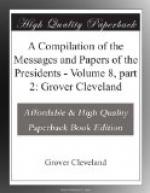It is impossible for me to look without grave concern upon a state of things which will leave the public service thus unprovided for and the public interests thus unprotected, and I earnestly urge upon your attention the necessity of making immediate appropriations for the maintenance of the service of the marshals and deputy marshals for the fiscal year which commences to-morrow.
RUTHERFORD B. HAYES.
[Footnote 27: See pp. 545-547.]
WASHINGTON, July 1, 1879.
To the Senate of the United States:
In answer to a resolution of the Senate of the 28th June, 1879, requesting a copy of any correspondence which may have passed between the Department of State and the Republic of Mexico in regard to the proposed Austin-Topolovampo Railroad survey across the northern States of that country, I transmit herewith the report of the Secretary of State upon the subject.
R.B. HAYES.
VETO MESSAGES.
EXECUTIVE MANSION, April 29, 1879.
To the House of Representatives:
I have maturely considered the important questions presented by the bill entitled “An act making appropriations for the support of the Army for the fiscal year ending June 30, 1880, and for other purposes,” and I now return it to the House of Representatives, in which it originated, with my objections to its approval.
The bill provides in the usual form for the appropriations required for the support of the Army during the next fiscal year. If it contained no other provisions, it would receive my prompt approval. It includes, however, further legislation, which, attached, as it is, to appropriations which are requisite for the efficient performance of some of the most necessary duties of the Government, involves questions of the gravest character. The sixth section of the bill is amendatory of the statute now in force in regard to the authority of persons in the civil, military, and naval service of the United States “at the place where any general or special election is held in any State.” This statute was adopted February 25, 1865, after a protracted debate in the Senate, and almost without opposition in the House of Representatives, by the concurrent votes of both of the leading political parties of the country, and became a law by the approval of President Lincoln. It was reenacted in 1874 in the Revised Statutes of the United States, sections 2002 and 5528, which are as follows:




